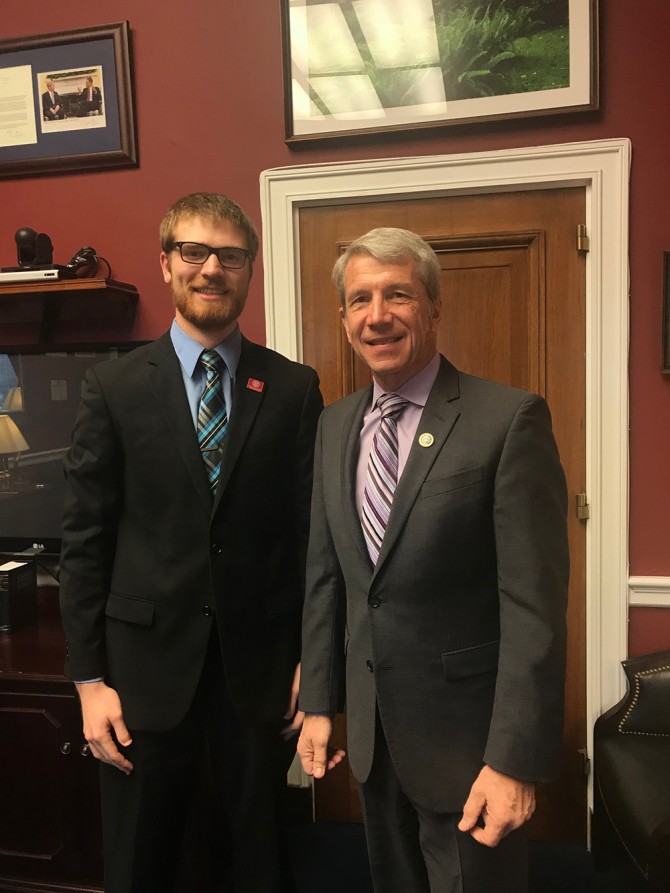CALS senior advocates for ag programs on Capitol Hill
Conor McCabe is first student delegate for CARET
By Rachel Rhodes
Delegates from Cornell traveled to Washington, D.C., March 4-7 to advocate for federal support of land-grant universities and agricultural research as part of the Association of Public Land Grant Universities’ Council for Agricultural Research, Extension and Teaching (CARET).
In past years, CARET brought together agricultural researchers, practitioners and educators from institutions across the country to exchange information and engage with policymakers. In 2018, CARET welcomed its first-ever student delegate, Conor McCabe ’18, who is pursuing an animal science degree focusing on dairy science at the College of Agriculture and Life Sciences (CALS).
McCabe was joined in D.C. by Cornell delegates James Bittner ’80, Bernadette Reichle and Linda Ameroso ‘82. He said: “Looking around the room, it is clear that the delegates from New York and other states have many perspectives on agricultural extension and research based on many years of experience in the field. I’m bringing a new perspective, having participated in these educational programs as a student and made plans to start a career in the field.”
The Cornell delegation participated in CARET training sessions designed to prepare them to advocate for increased federal support of programs like the National Institute of Food and Agriculture (NIFA), which provides funding for research in food and agriculture and has supported CALS innovations in food safety, conversion of dairy waste into biofuel, year-round vegetable production and urban agriculture. According to the American Assocation for the Advancement of Science, NIFA’s budget has hovered at around $800 million since 2009, making up about a third of total research and development spending at the U.S. Department of Agriculture but only 1 percent of total nondefense research and development spending.
“Land-grant universities like Cornell are built by and for the people,” said McCabe. “Extension and research programs supported by the federal government improve the lives of local residents and have impact at county, state and national levels. I’ve personally benefited from these federally funded programs, starting with 4-H in my home state of Oregon, continuing with my internship at Cornell Cooperative Extension and most recently with the opportunity to conduct research in animal nutrition labs on campus.”
The delegation met with members of Congress and staff on Capitol Hill to discuss federal funding of agricultural research, extension and education. McCabe urged Rep. Kurt Schrader ’74 (D-Ore.), his Congressman, to consider maintaining or boosting the amount of funding available for agricultural research and extension programs. McCabe also shared how such programs were intertwined with his education since moving to New York and have helped to shape his plans for the future.
“I want to use what I’ve learned at Cornell and through extension to build and grow programs similar to those that have helped me thrive, not just in the United States, but all over the world,” said McCabe. After graduation, he will join AgriCorps, an organization that coordinates volunteers to assist with experiential agricultural education in developing countries, and spend a year in Ghana or Liberia.
Of the experience as a CARET delegate, McCabe said: “I received such a warm reception from other delegates, and I hope that students continue to be represented in the group. Student engagement in advocacy has untapped potential – there is no limit to where we could go from here.”
Rachel Rhodes is a public affairs and media relations specialist in Cornell’s Washington, D.C. office.
Media Contact
Get Cornell news delivered right to your inbox.
Subscribe

